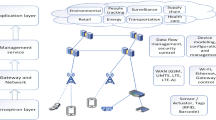Abstract
With mobile RFID technology, handheld portable devices like mobile phones and PDAs, also behave as RFID readers and RFID tags. As RFID readers, mobile phones provide an user-friendly approach to quickly and efficiently scan, access and view information about RFID tagged items. As RFID tags, mobile phones can quickly identify themselves in order to communicate with other tagged devices, which provide essential services. At the outset this paper briefly describes Mobile RFID technology and compare it with conventional RFID technology. We pioneer in categorizing Mobile RFID applications into three distinct zones, namely: Location-based Services (LBS) Zone, Enterprise Zone, and Private Zone. We describe application scenarios related to these zones and highlight various security and privacy threats. Finally, we propose a security architecture for LBS zone and describe our future work.
Preview
Unable to display preview. Download preview PDF.
Similar content being viewed by others
References
Sweeney II, P.J.: RFID for Dummies. Wiley Publishing Inc., Chichester (2005)
Juels, A.: RFID Security and Privacy: A Research Survey, RSA Laboratories (2005)
EPCglobal Web site (2005), http://www.EPCglobalinc.org
EPCglobal Inc., Class 1 generation 2 UHF air interface protocol standard version 1.0.9. (2005), Referenced 2005 at: http://www.epcglobalinc.org/standards/
VeriSign, The EPCglobal Network: Enhancing the Supply Chain, White Paper 2005, http://www.verisign.com/stellent/groups/public/documents/white_paper/002109.pdf
EPCglobal Specification, EPCglobal Architecture Framework Version 1.0, http://www.epcglobalinc.org/standards/
Author information
Authors and Affiliations
Editor information
Editors and Affiliations
Rights and permissions
Copyright information
© 2006 Springer-Verlag Berlin Heidelberg
About this paper
Cite this paper
Konidala, D.M., Kim, K. (2006). Mobile RFID Applications and Security Challenges. In: Rhee, M.S., Lee, B. (eds) Information Security and Cryptology – ICISC 2006. ICISC 2006. Lecture Notes in Computer Science, vol 4296. Springer, Berlin, Heidelberg. https://doi.org/10.1007/11927587_17
Download citation
DOI: https://doi.org/10.1007/11927587_17
Publisher Name: Springer, Berlin, Heidelberg
Print ISBN: 978-3-540-49112-5
Online ISBN: 978-3-540-49114-9
eBook Packages: Computer ScienceComputer Science (R0)




